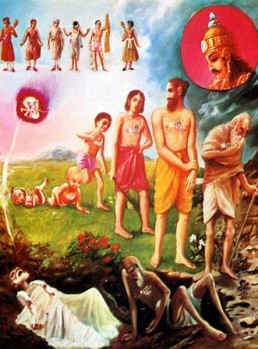Swami Chinmayananda Commentary
In case you refuse to engage yourself in this glorious war, then not only will you be renouncing your own “personal call-of-character” (Swadharma) and honour, in not having fulfilled your noble duty, but also incur positive sin. Not to face this army of un-Aryan forces is as much sinful as to murder and kill those who deserve not such a treatment.
Dharma, we have already explained, is the ‘law of being.’ Every living creature has taken up its form and has come into the world of objects for one great purpose, which is to gain an exhaustion of its existing mental impressions. The bundle of vasanas with which an individual has arrived into a particular incarnation is called his, “personal call-of-character” (Swadharma). When classified thus, Arjuna falls under the group of the ‘kingly’ (Kshatriya), who are characterised by adventurous heroism and an insatiable thirst for honour and fame.
Not to make use of the evolutionary chances provided by life is to reject and refuse the chances provided for a vasana CATHARSIS. By not exhausting the old vasanas, one will be living under a high vasana-pressure when the existing tendencies are crowded out by the influx of new tendencies. Not fighting the war, Arjuna may run away from the field, but he will certainly come to regret his lost chances, since his mind is so composed that he can find complete relief and solace only by living the intensely dangerous life of the battle-field. A boy with tendencies for art cannot be successfully trained to become a businessman, or an economist, since these are contrary to his nature. If an over-anxious parent, in the name of love, projects upon a growing child, his own intentions and plans, we invariably find that the young boy will have a crushed personality.
Examples of this type are seen everywhere in the world, especially so in the spiritual field. There are many seekers with over-enthusiasm for spiritual development, who, at the mere appearance of a misery, or at the threat of a sorrow, decide to run away into the jungles ‘seeking God,’ and they, invariably, end in a life-long tragic disaster. They have in them sensuous vasanas which can be satisfied only in the embrace of a family under the roof of their own tenement, but rejecting them all, they reach the Himalayan caves and then, all the day through, they can neither meditate upon the Lord, nor find a field for sensuous enjoyment. Naturally, they entertain more and more agitations in their minds, otherwise called sin (papa).
Sin in Hinduism is “a mistake of the mind in which it acts contrary to its essential nature as the Self.” Any act of sensuousness which the mind pants for in the world-of-objects, hoping to get thereby a joy and satisfaction, creates necessarily within itself more and more agitations and this type of a mistake of the mind is called a sin.
CONTINUING, NOT ONLY WILL YOU HAVE GIVEN UP YOUR DUTY AND FAME BUT ALSO:
Adi Sankara Commentary
Atha, on the other hand; cet, if; tvam, you; na karisyasi, will not fight; even imam, this; dharmyam, righteous; samgramam, battle, which has presented itself as a duty, which is not opposed to righteousness, and which is enjoined (by the scriptures); tatah, then, because of not undertaking that; hitva, forsaking; sva-dharmam, your own duty; ca, and; kritim, fame, earned from encountering Mahadeva (Lord Siva) and others; avapsyasi, you will incur; only papam, sin.
The Bhagavad Gita with the commentary of Sri Sankaracharya – Translated by Alladi Mahadeva Sastry
Holy Geeta – Commentary by Swami Chinmayananda
The Bhagavad Gita by Eknath Easwaran – Best selling translation of the Bhagavad Gita
The Bhagavad Gita – Translation and Commentary by Swami Sivananda
Bhagavad Gita – Translation and Commentary by Bhaktivedanta Swami Prabupadha
Srimad Bhagavad Gita Chapter 2 – Verse 33 – 2.33 atha chet tvam – All Bhagavad Gita (Geeta) Verses in Sanskrit, English, Transliteration, Word Meaning, Translation, Audio, Shankara Bhashya, Adi Sankaracharya Commentary and Links to Videos by Swami Chinmayananda and others – 2-33

